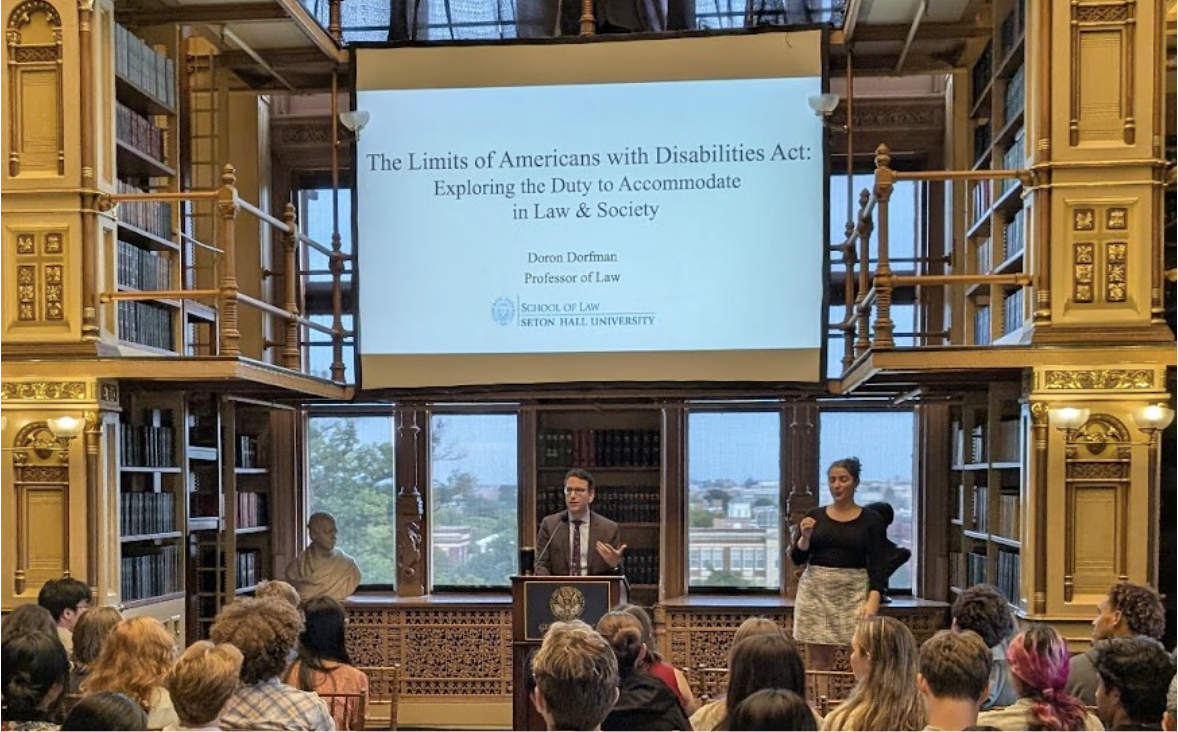
JOEL REYNOLDS / GEORGETOWN UNIVERSITY
Georgetown hosted Seton Hall law professor Doron Dorfman on September 25 for a talk on the limits of the American Disabilities Act, highlighting ongoing challenges of access, stigma, and accommodations in disability law.
In a Sept. 25 lecture at Riggs Library, Doron Dorfman, professor of disability law at Seton Hall University School of Law, contended that the Americans with Disabilities Act (ADA) remains too limited in scope, urging broader accommodations beyond its current mandates.
The event was cosponsored by the O’Neill Institute for National and Global Health Law at Georgetown University Law Center and Georgetown’s program in disability studies. Dorfman, whose work focuses on health law, disability law, employment law and family law, spoke about disabilities, disability theory and lived experience at the event.
Dorfman said disabled people are often forced to adapt to environments constructed without their conditions in mind.
“Disabled people or people with disabilities are in need of navigating a world that was designed and built without consulting their needs and without taking them into account,” Dorfman said at the event.
Dorfman said access is a crucial component of disabled peoples’ daily lives and an essential foundation to their legal rights.
“Access allows people with disabilities the right to live in the world,” Dorfman said. “Without access to physical spaces, to markets, to environments, people with disabilities cannot exercise their rights as equal citizens.”
Joel Reynolds, director of Georgetown’s program for disability studies, who attended and helped organize the event, said disability is a personal part of the human experience.
“Disability is central to human life,” Reynolds told The Hoya. “It always has been, and it always will be. Disability is something that is personal to absolutely everyone.”
Dorfman introduced the notion of negative rights, or freedom without interference by others, as the basis of U.S. law and the U.S. legal system. A common example is the right to free speech, which mandates that the government is not permitted to interfere with an individual’s ability to express themselves.
Dorfman said accommodations are a positive right, which he defines as a right that compels government entities to provide a benefit to the right bearer.
“Positive rights impose a duty to act on others. Reasonable accommodations are a positive right element within American law that is based in the negative rights tradition,” Dorfman said. “Because they actively remove barriers and alter environments that will allow access for people with disabilities.”
Infringement upon these accommodations is considered discrimination according to the ADA, a civil rights law prohibiting discrimination against disabled people.
Dorfman said critics frame accommodations within the special rights discourse, arguments that essentially characterize rights claims of marginalized groups, often identifying specific accommodations as preferential treatment.
“The overly broad view of not distinguishing between affirmative action and end of discrimination leads to this special rights discourse, arguing that minority groups get an unfair advantage by disguising their demands as striving to achieve equal rights or an even playing field,” Dorfman said.
Dorfman addressed what he refers to as the “fear of disability con,” a widespread suspicion that people feign their disabilities to gain an unfair advantage in society, saying one of the ADA’s limits is its inability to reduce this stigma.
“What the ADA didn’t do well is to change attitudes about disability,” Dorfman said. “I think a lot of my work deals with the idea about the fear of the disability con, these perceptions of fakery. I do think that today in the United States, many people equate disability with fakery, and that’s a big barrier.”
Natalie Gustin (SFS ’26), a disability studies student program assistant, said the ADA should be understood as the bare minimum for accessibility rather than the final word on disability rights.
“People often think, ‘Oh, we have the ADA now, so that’s as much as disabled people need,’” Gustin told The Hoya. “But the ADA is the floor — it represents the bare minimum for accessibility. The ADA is actually shockingly vague and up to interpretation, hence the decades of case law on its applicability.”
“Having conversations about how the ADA falls short is vital to recognizing the work that still needs to be done to make our world completely accessible to people with disabilities,” Gustin added.
Third-party accommodations, a term coined by Dorfman, refer to accommodations that require others to change their behavior to adapt to an individual with a disability.
Reynolds said there is still work to be done regarding the limits of the ADA using third-party accommodations in the future.
“There are not only limits to the ADA, but there’s still more potential to create opportunities and create access for disabled people,” Reynolds said. “This idea of third-party accommodations and the ways in which we can expand our current understanding of the ADA is really generative and exciting.”
Dorfman said he is optimistic for the future of disability law and disability studies.
“I am always very hopeful that my work really affects the everyday life of people,” Dorfman said. “And I hope people get some kind of familiarity with this type of work and maybe want to even learn further.”